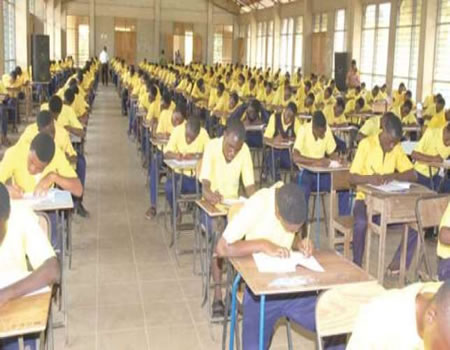IT is no longer news that only about half or less of the total candidates who sit the West African Senior Secondary Certificate Examinations (WASSCE) conducted by the West African Examinations Council (WAEC) usually obtain credit and above in at least five subjects, including English language and mathematics that could earn them admission into higher institutions.
That has been the situation over the years, especially in the recent editions of the May/June school examinations and the November/December private examinations, including that of this year.
The major concern in this regard is about the persistent huge disparity in the percentage number of candidates who pass the examination compared with the one organised by the National Examination Council (NECO).
For NECO, the percentage of students obtaining credit and above passes in at least five subjects is not only hovering around 65 and 70 per cent of the total candidates, but has been steadily rising in the last five years.
WAEC is owned by five West African countries: Ghana, Sierra Leone, The Gambia, Senegal, and Nigeria; while NECO is solely owned by the Nigerian government.
Students who sit for the two examinations here in Nigeria are the same, and are exposed to the same conditions. Or, are they? Though they are not taught by the same teachers, their curriculum is the same. They are also, perceptively, exposed to the same school and home environment, culture and social system.
What they come up with as answers in the examinations are equally marked and assessed by the same set of teachers. The only difference is the examination bodies and the respective examination periods.
What then could explain the persistent disparity in the overall performance of candidates in the two examinations that is widening yearly as shown by statistics obtained from both organisations?
According to the statistics, while only 49.98 per cent (923,486) of the total 1,572,396 candidates who sat the April/May WASSCE conducted in 2018 obtained credit and above in five or more subjects, including English language and mathematics, 71.48 per cent (738,195) of the total 1,032,729 candidates had similar results in NECO examination the same year.
Similarly, while the 2017 edition of WAEC’s May/June examination was a bit better, with record showing 59.22 per cent (i.e. 923,486) of the total 1,559,162 candidates who sat the examination; that of NECO examination was up to 70.85 per cent (i.e. 745,053) of the total 1,051,472 candidates who scored similar grades.
For 2016, 2015 and 2014, WAEC records showed 52.97 per cent (878,040), 38.68 per cent (616,370) and 31.28 per cent (529,425) of the total 1,552,758, 1,593,442 and 1, 692,435 candidates respectively that sat the examination in those years had similar results; while that of NECO showed 69.74 per cent (905,011), 68. 56 per cent (745,053) and 52.29 per cent (511, 931) of total 1,022, 474, 969,491 and 978,886 candidates in 2016, 2015 and 2014 respectively who sat the examination.
Stakeholders, including the students, and the examining bodies themselves, maintain diverse views on this development.
While some believe that the disparity could be as a result of one examining body considering its certificate superior to the other and as a result is stricter with its assessment, many say such claim holds no water.
Many students who spoke to Tribune Education on the matter said both examinations are strict, but that candidates’ performance depends on their level of preparation.
In that school of thought is Faidat Seriki, a 400-level Banking and Finance student of the Lagos State University, Ojo. Ms Seriki had taken both examinations in 2013 as a student of Government Senior College, Agege, Lagos, where she had her secondary education.
According to her, she sat the WASSCE first between May and June of that year, and then NECO SSCE the following months.
“But I performed better in WASSCE than NECO, though I did the examination first before NECO,” she noted.
Seriki’s results as shown to Tribune Education revealed that while she had B3 in English language in WASSCE, she had C6 in the NECO examination in the same subject.
For Mathematics, she had D7 in WASSCE and C5 in NECO SSCE. In Economics and Government, she had C4 and B3 in WASSCE while she had B2 and C4 in NECO examination in both subjects. In Financial Accounting, she had the same grade, B2, in both exams while she had A1 in WASSCE Commerce and C6 in the same subject in NECO.
Seriki also scored C5 in Biology and C6 in Yoruba language in WASSCE, while she had C6 and B3 respectively in the NECO examination.
“So for me, I would rather say it is easier to pass WAEC exams than NECO’s. If not for the D7 I had in Mathematics in WASSCE and I didn’t want to combine results, I would have used the WASSCE results to gain admission into LASU,” she said.
Similarly, Adetoun Adewale, a 400-Level Business Education student of the University of Lagos, Akoka, has also taken both examinations. He did his in 2008.
Though he did not have his results in WASSCE as the organization did not release them for reasons he said he did not know till today, he believes he did well in the examination.
“But I didn’t bother myself on the result again since my NECO results came out fine that same year. And that is the results I used to gain direct entry admission into UNILAG having had my Nigeria Certificate in Education from the Adeyemi College of Education, Ondo,” he explained.
Adewale had C5 in English language, Mathematics, Financial Accounting, Government, Geography, Yoruba and C6 in both Economics and Yoruba language.
“So for me, I think both examinations are difficult to pass. But even so, I would say NECO is more tedious to pass than WASSCE, while NECO’s marking scheme seems to be simpler,” he reasoned.
The vice chancellor, UNILAG, Professor Oluwatoyin Ogundipe, as well as Mrs Funmilayo Olorunda, a mathematics teacher at the Federal Science and Technical College, Yaba, Lagos, also offered their opinions on the matter, separately.
They both believe that the disparity could be as a result of time frame that the students sit both examinations and they could not say categorically that one examination is superior to the other.
“There is tendency for students to improve on subjects they have deficient in during WAEC exams and rectify their mistakes and get more prepared for NECO exams,” Ogundipe pointed out. “And that could be a major reason for more candidates passing NECO exam.”
But when he was asked why UNILAG does not accept NECO certificate for admission, if truly the certificate is credible as some people claim, Ogundipe refuted the claim, saying it is far from the truth.
NECO certificate, according to him, is as credible and internationally recognised as WAEC’s.
“The only problem, I think, is that by the time NECO would be releasing its results, schools would have asked prospective students to upload their results for admission. And there is nothing anybody can do about that, except the two bodies are releasing their results at the same time.
“So, just like every other institution in and outside the country, UNILAG accepts both WAEC and NECO results, and people should therefore not claim what they can’t substantiate,” he explained.
Corroborating him is Mr Kunle Akogun, the spokesman for the University of Ilorin. Akogun said even though he didn’t know what could be responsible for the huge disparity in the results of both organisations’ examinations, UNILORIN does not only accept NECO certificate, it also values and treats it as equal with that of WAEC in all instances, including admission.
Interestingly, both examination bodies strongly believe in their certificates, with each claiming that its certificate is not only credible, but also internationally recognised.
The Head of Public Affairs of the organisation, Mr. Damianus Ojijeogu, told Tribune Education that inasmuch as he would not want to compare his organization’s examinations with another, he knows that WAEC would never compromise standards.
“WAEC as a big institution cannot for any reason do anything to (discredit) its hard-earned reputation and credibility; and that is why our certificate is ranked competitively with other world-class and big examination bodies anywhere around the world. Therefore, students can only be graded according to their performance,” he stressed.
On his own part, also in an exclusive conversation, the Head of Information Unit of NECO, Mr. Azeez Sanni, told Tribune Education that people should know that NECO does not mark examinations but teachers do, and that each candidate’s result is a reflection of his or her performance.
“But one thing I can say is that the steady improvement of students in NECO exams is a function of many factors, including improved government policies on education, provision of better learning and teaching tools and so forth – all culminating in the overall improved performance in the examination.
“So, people should not be deceived that NECO certificate is not recognised abroad. That is falsehood as there is no institution anywhere in the world that does not recognise NECO certificate. Whoever that is claiming that should be able substantiate it by mentioning at least one institution as example. All is politics to discredit NECO.
“Though, I won’t want to name any organisation, the issue is that our competitor doesn’t feel comfortable with our achieved track record some couple of years now, and therefore won’t want NECO to be in existence again. That is why they do all sorts of things to rubbish NECO.
“So, let whoever that claims that NECO certificate is not recognised come out in public with a proof. All is about politics,” he said.






